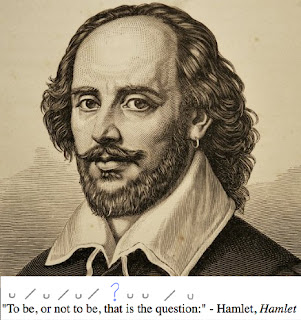Deliberation in Shakespeare
Shakespeare's plays are fueled by decisions made by the characters. Sometimes these decisions are automatic reactions to their circumstances, but most Shakespearean decisions require heavy deliberation on the part of the characters. In addition to propelling the plot and giving us an insight into Shakespeare's characters, these monologues are moments of discovery particularly suitable for auditions. These monologues rest solely on the power of the actor, needing little scenery or special effects or even involvement from others.
Below are four of the most powerful moments of deliberation in Shakespeare, along with their immediate dramatic circumstances and the decision reached. The moment when the decision is made is up to the actor's interpretation; however, each monologue come with a textually-based interpretation that appears highlighted in yellow in the text of the monologue and is explained in the third section, Decision reached.
In these three monologues, characters from Shakespeare's tragedies weigh the importance of loyalty against human life.
1. Macbeth in Macbeth
DRAMATIC CIRCUMSTANCES:
TEXT OF THE MONOLOGUE:
It were done quickly: if th'assassination
Could trammel up the consequence, and catch
With his surcease success; that but this blow
Might be the be-all and the end-all –– here
But here, upon this bank and shoal of time,
We'd jump the life to come. –– But in these cases,
We still have judgement here; that we but teach
Bloody instructions, which, being taught, return
To plague th'inventor: this even-handed Justice
Commends th'ingredience of our poison'd chalice
To our own lips. He's here in double trust:
First, as I am his kinsmen and his subject,
Strong both against the deed; then, as his host,
Who should against his murtherer shut the door,
Not bear the knife myself. Besides, this Duncan
Hath borne his faculties so meek, hath been
So clear in his great office, that his virtues
Will plead like angels, trumpet-tongu'd, against
The deep damnation of his taking-off;
And Pity, like a naked new-born babe,
Striding the blast, or heaven's Cherubins, hors'd
Upon the sightless couriers of the air,
Shall blow the horrid deed in every eye,
That tears shall drown the wind. –– I have no spur
Vaulting ambition, which o'erleaps itself
DECISION REACHED:
2. Brutus in Julius Caesar
DRAMATIC CIRCUMSTANCES:
This monologue occurs after Cassius has suggested to Brutus that Caesar has too much ambition and is becoming corrupt. Cassius urges Brutus to consider what is best for the world of the Romans––and believes that he can convince Brutus (if he has not already) to help him kill Caesar.
TEXT OF THE MONOLOGUE:
I know no personal cause to spurn at him
But for the general. He would be crowned:
How that might change his nature, there's the question.
It is the bright day that brings forth the adder,
And that craves wary walking. Crown him that,
And then I grant we put a sting in him
That at his will he may do danger with.
Th'abuse of greatness is when it disjoins
Remorse from power; and to speak truth of Caesar
I have not known when his affections swayed
More than his reason. But 'tis a common proof
That lowliness is young ambition's ladder
Whereto the climber upward turns his face;
But when he once attains the upmost round
He then unto the ladder turns his back,
Looks in the clouds, scorning the base degrees
By which he did ascend. So Caesar may.
Then, lest he may, prevent. And since the quarrel
Will bear no colour for the thing he is,
Fashion it thus: that what he is, augmented,
Would run to these and these extremities.
And therefore think him as a serpent's egg
Which hatched, would as his kind grow mischievous,
DECISION REACHED:
3. Hamlet in Hamlet
DRAMATIC CIRCUMSTANCES:
TEXT OF THE MONOLOGUE:
And now I'll do't. [Draws his sword.]
And so a goes to heaven;
And so am I reveng'd. That would be scann'd:
A villain kills my father, and for that
I, his sole son, do this same villain send
To heaven.
Why, this is hire and salary, not revenge.
A took my father grossly, full of bread,
With all his crimes broad blown, as flush as May;
And how his audit stands who knows safe heaven?
But in our circumstance and course of thought
'Tis heavy with him. And am I then reveng'd,
To take him in the purging of his soul,
When he is fit and season'd for his passage?
No.
Up, sword, and know thou a more horrid hent:
When he is drunk asleep, or in his rage,
Or in th'incestuous pleasure of his bed,
At game a-swearing, or about some act
That has no relish of salvation in't,
Then trip him, that his heels may kick at heaven
And this his soul may be as damn'd and black
As hell, whereto it goes. My mother stays.
DECISION REACHED:
In this monologue from Measure for Measure (a problem play), Isabella weighs the importance of her personal value of chastity against the value of her brother's life.
4. Isabella in Measure for Measure
DRAMATIC CIRCUMSTANCES:
TEXT OF MONOLOGUE:
Who would believe me? O perilous mouths,
That bear in them one and the self-same tongue
Either of condemnation or approof,
Bidding the law make curtsey to their will,
Hooking both right and wrong to th'appetite,
To follow as it draws! I'll to my brother.
Though he hath fall'n by prompture of the blood,
Yet hath he in him such a mind of honour,
That he had he twenty heads to tender down
On twenty bloody blocks, he'd yield them up
Before his sister should her body stoop
To such abhorr'd pollution.
Then, Isabel live chaste, and brother, die;
More than our brother is our chastity.
I'll tell him yet of Angelo's request,




Comments
Post a Comment
All comments are moderated by the Green-Eyed Blogger to avoid spam. If you do not see your comment right away, do not worry; it is simply undergoing our routine moderation process.